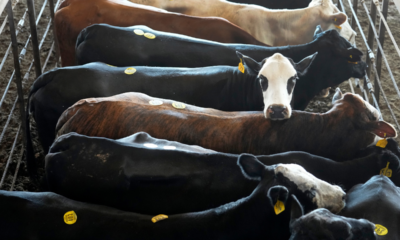Texas
World's largest 3D-printed neighborhood nears completion in Texas
By Evan Garcia
GEORGETOWN, Texas (Reuters) – As with any desktop 3D printer, the Vulcan printer pipes layer by layer to build an object – except this printer is more than 45 feet (13.7 m) wide, weighs 4.75 tons and prints residential homes.
This summer, the robotic printer from ICON is finishing the last few of 100 3D-printed houses in Wolf Ranch, a community in Georgetown, Texas, about 30 miles from Austin.
ICON began printing the walls of what it says is the world’s largest 3D-printed community in November 2022. Compared to traditional construction, the company says that 3D printing homes is faster, less expensive, requires fewer workers, and minimizes construction material waste.
“It brings a lot of efficiency to the trade market,” said ICON senior project manager Conner Jenkins. “So, where there were maybe five different crews coming in to build a wall system, we now have one crew and one robot.”
After concrete powder, water, sand and other additives are mixed together and pumped into the printer, a nozzle squeezes out the concrete mixture like toothpaste onto a brush, building up layer by layer along a pre-programmed path that creates corduroy-effect walls.
The single-story three- to four-bedroom homes take about three weeks to finish printing, with the foundation and metal roofs installed traditionally.
Jenkins said the concrete walls are designed to be resistant to water, mold, termites and extreme weather.
Lawrence Nourzad, a 32-year-old business development director, and his girlfriend Angela Hontas, a 29-year-old creative strategist, purchased a Wolf Ranch home earlier this summer.
“It feels like a fortress,” Nourzad said, adding that he was confident it would be resilient to most tornados.
The walls also provide strong insulation from the Texas heat, the couple said, keeping the interior temperature cool even when the air conditioner wasn’t on full blast.
There was one other thing the 3D-printed walls seemed to protect against, however: a solid wireless internet connection.
“Obviously these are really strong, thick walls. And that’s what provides a lot of value for us as homeowners and keeps this thing really well-insulated in a Texas summer, but signal doesn’t transfer through these walls very well,” Nourzad said.
To alleviate this issue, an ICON spokeswoman said most Wolf Ranch homeowners use mesh internet routers, which broadcast a signal from multiple units placed throughout a home, versus a traditional router which sends a signal from one device.
The 3D-printed homes at Wolf Ranch, called the “Genesis Collection” by developers, range in price from around $450,000 to close to $600,000. Developers said a little more than one quarter of the 100 homes have been sold.
ICON, which 3D-printed its first home in Austin in 2018, hopes to one day take its technology to the Moon. NASA, as part of its Artemis Moon exploration program, has contracted ICON to develop a construction system capable of building landing pads, shelters, and other structures on the lunar surface.
(Reporting by Evan Garcia, Editing by Rosalba O’Brien)

Texas
St. Andrew’s Prom Closet helps North Texas teens shine without the high cost

It’s that time of year again – prom season. For many students, it’s a night to remember, but between dresses and other expenses, the costs can add up quickly. Every year, St. Andrew’s Methodist Church steps up to help ease the financial burden for families, offering free prom dresses and accessories to young women.
“I’m feeling very excited, very happy, you know it’s all like coming to me at once,” said Gabrielle Bennett, a high school junior.
Prom season is a moment many young girls look forward to, and finding the perfect dress.
Boutique experience for every shopper
“It was a lot of searching through a lot of dresses.. and seeing what fits, what doesn’t, what looks nice, and then you finally find one, and it fits perfect,” said Ally Atkins, a high school senior.
For 17 years, St. Andrew’s Methodist Church has opened its prom closet to girls across North Texas, helping those who may not be able to afford the high cost of prom. This year, organizers hope to serve 1,400 shoppers. There are more than 5,000 dresses to choose from in different colors, styles, and sizes.
“Every young lady should feel special at prom. Every young lady deserves to be beautiful, and in some cases, some of these young ladies, this would not be possible,” said Kathy Moore, a Prom Closet chairman.
Community donations make it possible
The experience is designed to feel like a real boutique – from trying on dresses to grabbing the perfect shoes, bag, and accessories. Everything is donated.
“I had one yesterday that walked into our dress area, and she stopped and just said, ‘wow,’ and so right there, that moment, that’s why we do it,” Moore said.
Organizers said the event is made possible by community donations and dozens of volunteers, but they’re always looking for more help. Next year, they hope to serve even more girls, continuing their mission to make more prom dreams come true.
“I want to thank this whole organization, I’m very grateful,” Bennett said.
How to participate
If you know someone who may need a prom dress this season, the Prom Closet is open until March 7. It is by appointment only. For more information, visit: https://standrewmethodist.org/prom-closet/
Texas
U.S. and Israel carry out joint military strikes against Iran
Texas
Texas to require proof of identity, legal status for new vehicle titles March 5, 2026

EL PASO, TEXAS (KFOX14/CBS4) — A major change is coming to how vehicles are titled and registered in Texas, with local officials and border-area dealerships bracing for questions, delays and the possibility that some buyers could take their business out of state.
Beginning March 5, 2026, Texans applying for an original vehicle title and registration will need proof of identity and proof of legal status in the United States.
The Texas Motor Vehicle Board approved a new rule requiring county tax offices to verify that documentation before processing those transactions.
“If the person doesn’t have valid ID, we cannot register their vehicle,” said Ruben Gonzalez, the El Paso County tax assessor-collector.
Gonzalez said the rule is mandatory statewide and is not a local policy, but a state mandate he is required to follow as an agent of the DMV.
Under the rule, buyers must present a REAL ID-compliant Texas ID or other federally recognized documents, including a passport or permanent resident card.
Gonzalez said the rule takes effect March 5 for new titles and registrations, but proof of legal status for registration renewals will not be required until Jan. 1, 2027.
“We’re going to give a year’s time for those people to qualify, but more so to allow the entities, businesses like lean holders and dealers and the county offices to be trained on what’s an acceptable form of documentation to accept from people that are renewing online or in our offices,” Gonzalez said.
Destiny Venecia reports on Texas to require proof of identity and legal status for vehicle titles, registrations (Credit: KFOX14)
RECOMMENDED: El Paso residents report natural gas bills nearly doubling, citing surprising fees
Local dealerships said they are working to adapt, but some employees and customers are uneasy about the change.
Luis Fierro, president of the El Paso Hispanic Independent Automobile Dealer Association, said, “My personnel is a little bit scared to make a mistake. Within the dinner community, they’re all scared, they’re all lost in the system. They’re trying to figure out, as we all believe, an ID was a real ID. Now we find out that what we knew that was good to be used is no longer good.”
Border-area dealerships also worry customers could buy and register vehicles in New Mexico, taking taxes and fees out of Texas.
“Customers are scared of the new implementation, that they’re going to take their business to New Mexico, pay their taxes in New Mexico, and handle the registration and renewals in the state of New Mexico and avoid Texas,” Fierro said.
County leaders said the concern extends beyond lost sales to lost revenue for Texas counties.
“It’s going to be a loss of revenue because if they go to New Mexico, we can’t collect our fees that are due because they’re all they’re running using our highways,” Gonzalez said.
County officials said they expect an increase in questions and possible delays in the first few months after the rule takes effect March 5, 2026.
RECOMMENDED: Texas bans temporary paper license plates to curb fraud
Sign up to receive the top interesting stories from in and around our community once daily in your inbox.
-

 World3 days ago
World3 days agoExclusive: DeepSeek withholds latest AI model from US chipmakers including Nvidia, sources say
-

 Massachusetts4 days ago
Massachusetts4 days agoMother and daughter injured in Taunton house explosion
-

 Montana1 week ago
Montana1 week ago2026 MHSA Montana Wrestling State Championship Brackets And Results – FloWrestling
-

 Denver, CO4 days ago
Denver, CO4 days ago10 acres charred, 5 injured in Thornton grass fire, evacuation orders lifted
-

 Louisiana6 days ago
Louisiana6 days agoWildfire near Gum Swamp Road in Livingston Parish now under control; more than 200 acres burned
-

 Technology1 week ago
Technology1 week agoYouTube TV billing scam emails are hitting inboxes
-

 Technology1 week ago
Technology1 week agoStellantis is in a crisis of its own making
-

 Politics1 week ago
Politics1 week agoOpenAI didn’t contact police despite employees flagging mass shooter’s concerning chatbot interactions: REPORT






















